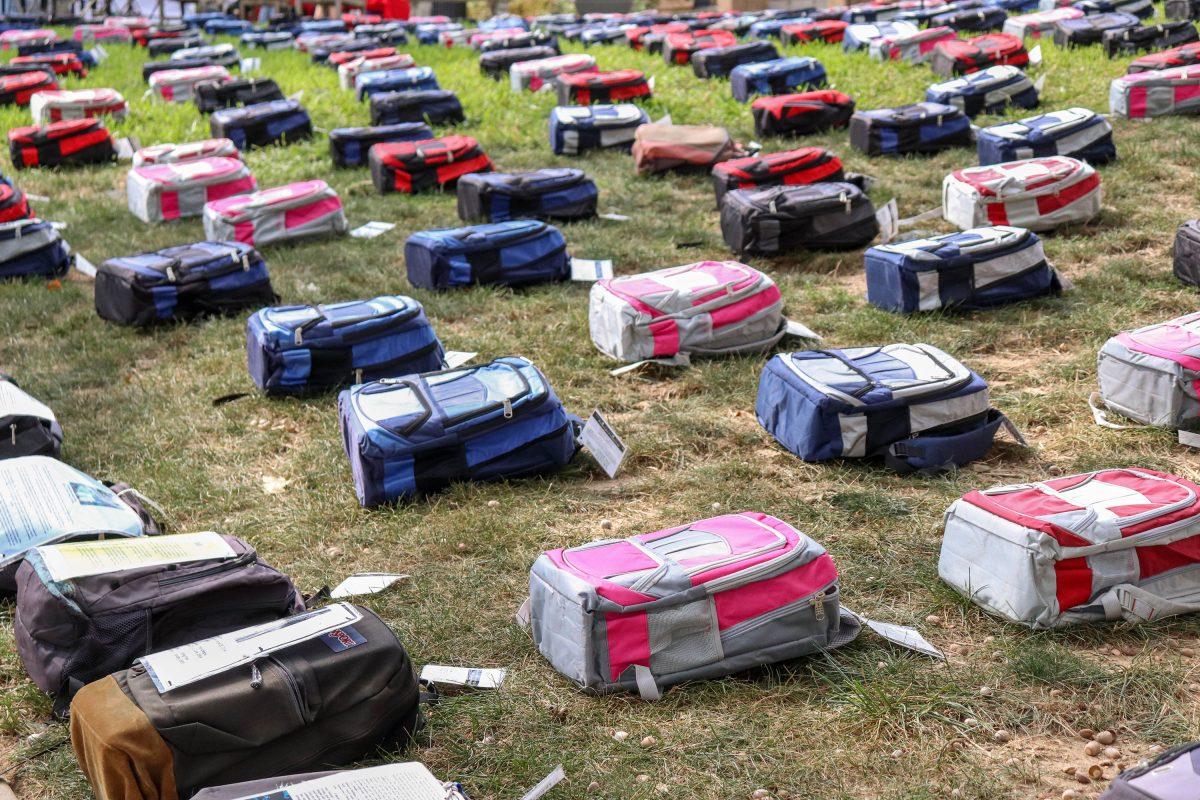About 8,000 students roam Hawk Hill everyday, walking to class, Campion Student Center, the bookstore or Starbucks. Many times you see a friendly face: a classmate, an orientation leader, someone from your floor, or some club doing a fun activity.
What made this Tuesday different from others was that students saw nearly one thousand backpacks covering the courtyard outside Campion, each one representing a college student who has died by suicide.
The exhibit was unveiled on Sept. 10, National Suicide Prevention Day.
The St. Joe’s chapter of Active Minds held the Send Silence Packing exhibit throughout the day to not only spread awareness about the effects of suicide, but also to show people how to talk about mental illness and guide them to the proper resources.

Marybeth Ayella, Ph.D., assistant professor of sociology, with the help of Counseling and Psychological Services (CAPS), brought the Active Minds program to St. Joe’s in 2011 and serves as the advisor to the chapter. Ayella said the event creates a dialogue about mental health and suicide.
“There are not enough psychologists, psychiatrists, social workers in this country to deal with the mental health epidemic we face,” Ayella said. “We need people who can listen without judgement, acknowledge the pain of others, and direct them to resources.”
The Send Silence Packing exhibit was brought to St. Joe’s campus twice before in 2012 and 2015 and includes stories about individuals who lost their lives to suicide, typically told by the individual’s family or friends.
“This event is really powerful,” said Joey Lam ’21, the community outreach chair for Active Minds at St. Joe’s. “I think sometimes talking about mental health does not mean actively engaging in a conversation, but for students to take it in a more passive way is empowering.”

According to the National Alliance on Mental Health, 75 percent of mental illnesses start before the age of 24, making this issue relevant to college students.
Gregory Nicholls, Ph.D., director of CAPS, said because the topic can easily be “pushed under the rug” or stigmatized, getting help from resources can show students how to recognize classmates who are suffering and how to help them.
“As students go around and read and realize this is going on, they’re probably more motivated to want to do something about it,” Nicholls said.
Ayella said a simple way to discuss mental health with friends or loved ones through a simple method: validate, appreciate and refer.
This starts with realizing the signs of a mental illness, validating the individuals feelings, appreciating the courage to discuss such a difficult topic, and refer them to the proper resources.
“It’s a set of skills that we can give to anyone in any situation,” Ayella said.
Despite the darkness that comes with a topic such as suicide, Ayella said that through her work with Active Minds, she has met wonderful people and heard stories of success and resilience. She offers a familiar image to students when talking about resiliency: our mascot, the Hawk.
“No matter if Villanova is beating us by a hundred points, that Hawk keeps going,” Ayella said. “If the Hawk gets knocked down, he gets back up and keeps flapping. That’s what resiliency is; it’s being able to get back up from the setbacks you face.”
If you or someone you know might be at risk of suicide, call the National Suicide Prevention Lifeline at 1-800-273-8255.
















































